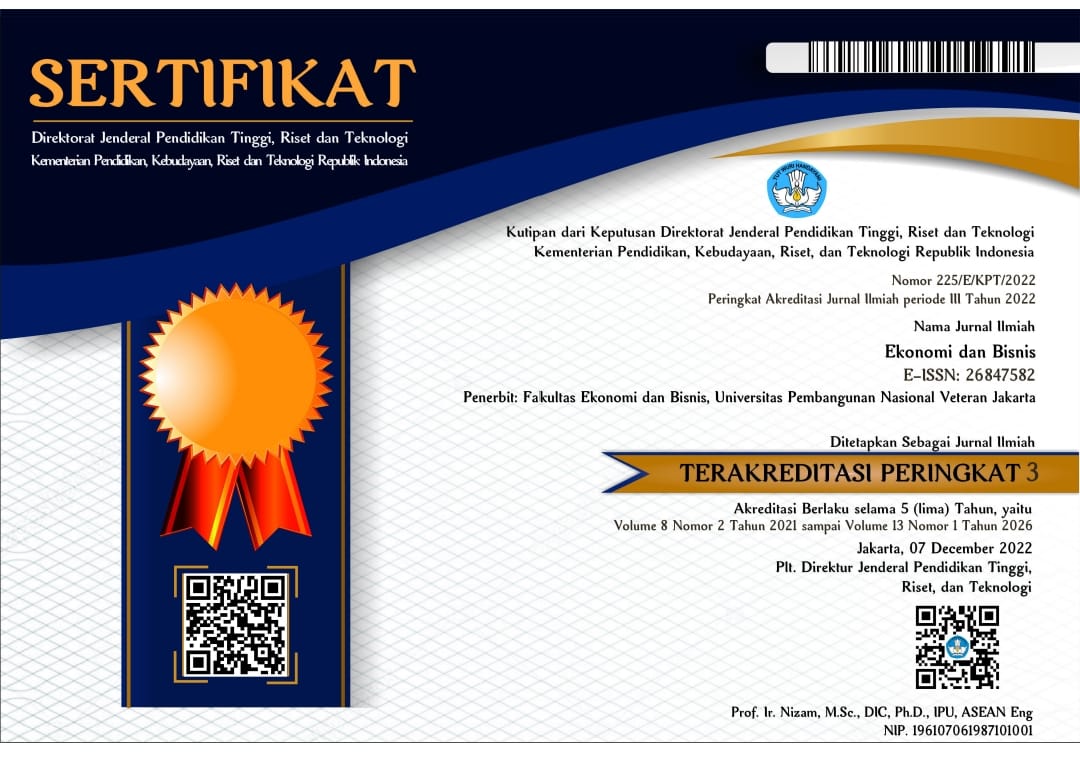Pengaruh Religiusitas dan Insentif Keuangan terhadap Intensi Melakukan Whistleblowing pada Faith-Based Organization
DOI:
https://doi.org/10.35590/jeb.v5i1.682Kata Kunci:
Whistleblowing, Faith-Based Organization, Religious, Financial IncentivesAbstrak
Whistleblowing, nowadays, is a common practice many organizations to detect fraud. This research aims to analyze the extent of the effect of financial incentives on employees’ intentions in faith-based organizations (FBO) to do whistleblowing. Individuals who works in FBO have different characteristics from individuals who work in profit-oriented companies. One of the characteristic uniqueness of employees who work in FBO is their motivation to work is more driven by religious values rather than financial incentives. Using the between-group subjects design, the results shows that religious and financial incentives affect the intentions of FBO employees to report fraud.
Referensi
ACFE Indonesia Chapter, 2017. Survey Fraud Indonesia 2016, Jakarta: ACFE Indonesia Chapter. Andon, P. et al., 2018. The Impact of Financial Incentives and Perceptions of Seriousness on Whistleblowing Intention. Journal of Business Ethics, 151(1), pp. 165-178.
Association of Certified Fraud Examiner, 2018. Report to The Nations: 2018 Global Study on Occupational Fraud and Abuse, New York: ACFE.
Bart, V., Trevino, L. K. & Shapiro, D. L., 1993. Peer Reporting of Unethical Behavior: The Justice Evaluations and Social Context Factors. Journal of Business Ethics, 12(4), pp. 253-263.
Bassous, M., 2015. What are the Factors that Affect Worker Motivation in Faith-Based Nonprofit Organizations? VOLUNTAS: International Journal of Voluntary and Nonprofit Organizations, 26(1), pp. 355-381.
Clarke, G., 2006. Faith Matters: Faith Based Organisations, Civil Society and International Development. Journal of International Development, Volume 18, pp. 835-848.
Clarke, M. & Ware, V.-A., 2015. Understanding Faith-Based Organizations: How FBOs are Contrasted with NGOs in International Development Literature. Progress in Development Studies, 15(1), pp. 37-48.
Curtis, M. B. & Taylor, E. Z., 2009. Whistleblowing in Public Accounting: Influence of Identity Disclosure, Situational Context, and Personal Characteristics. Accounting and Public Interest, Volume 9, pp. 191-220.
Donahue, M. J., 1985. Intrinsic and Extrinsic Religiousness: Review and Meta-Analysis. Journal of Personality and Social Psychology, 48(2), pp. 400-419.
Ebaugh, H. R., Pipes, P. F., Chafetz, J. S. & Daniels, M., 2003. Where's the Religion? Distinguishing Faith-Based from Secular Social Service Agencies. Journal for the Scientific Study of Religion, 42(3), pp. 411-426.
Lei, G. & Brink, A. G., 2017. Whistleblowing studies in accounting research: A review of experimental studies on the determinants of whistleblowing. Journal of Accounting Literature, Volume 38, pp. 1-13.
Longenecker, J. A., McKinney, J. A. & Moore, C. W., 2004. Religious Intensity, Evangelical Christianity, and Business Ethics: An Empirical Study. Journal of Business Ethics, 55(4), pp. 371-384.
Mesmer-Magnus, J. R. & Viswesvaran, C., 2008. Whistleblowing in Organizations: An Examination of Correlates of Whistleblowing Intentions, Actions, and Retaliations. Journal of Business Ethics, 62(3), pp. 277-297.
Monsma, S. V., 2012. Pluralism and Freedom: Faith Based Organization in a Democratic Society. Plymouth: Rowman & Littlefield Publishers, Inc.
Nayir, D. Z. & Herzig, C., 2012. Value Orientations as Determinants of Preference for External and Anonymous Whistleblowing. Journal of Business Ethics, 107(2), pp. 197-213.
Near, J. P. & Miceli, M. P., 1985. Organizational Dissidence: The Case of Whistle-Blowing. Journal of Business Ethics, 4(1), pp. 1-16.
Near, J. P. & Miceli, M. P., 1995. Effective Whistle-Blowing. The Academy of Management Review, 20(3), pp. 679-708.
SHRM, 2017. Employee Job Satisfaction and Engagement: The Doors of Opportunity Open, s.l.: Society for Human Resource Management.
Smith, S. R. & Sosin, M. R., 2001. The Varieties of Faith-Related Agencies. Public Administration Review, 61(6), pp. 651-670.
Stikeleather, B. R., 2016. When do Employers Benefit from Offering Workers a Financial Reward for Reporting Internal Misconduct? Accounting, Organizations and Society, Volume 52, pp. 1-14.
Swimberghe, K., Flurry, L. A. & Parker, J. M., 2011. Consumer Religiosity: Consequences for Consumer Activism in the United States. Journal of Business Ethics, 103(3), pp. 453-467.
The Institute of Internal Auditors, 2009. IPPF Practice Guide - Internal Audit and Fraud, Florida: The Institute of Internal Auditors.
Trevino, L. K. & Victor, B., 1992. Peer Reporting of Unethical Behavior: A Social Context Perspective. The Academy of Management Journal, 35(1), pp. 38-64.
Valentinov, V., 2007. The Property Rights Approach to Nonprofit Organization: The Role of Intrinsic Motivation. Public Organization Review, 7(1), pp. 41-55.
Weaver, G. R. & Agle, B. R., 2002. Religiosity and Ethical Behavior in Organizations: A Symbolic Interactionist Perspective. The Academy of Management Review, 27(1), pp. 77-97.
Woodrum, E., 1988. Determinants of Moral Attitudes. Journal for the Scientific Study of Religion, 27(4), pp. 553-573.
Worthington, Jr., E. L. et al., 2012. The Religious Commitment Inventory-10 (RCI-10). [Online] Available at: https://www.midss.org/sites/default/files/rci-10_scoring_and_norms.pdf [Accessed 6 August 2018].
Xu, Y. & Ziegenfuss, D. E., 2008. Reward Systems, Moral Reasoning, and Internal Auditors’ Reporting Wrongdoing. Journal of Business and Psychology, 22(4), pp. 323-331.
Unduhan
File Tambahan
Diterbitkan
Cara Mengutip
Terbitan
Bagian
Lisensi
Kebijakan yang diajukan untuk jurnal yang menawarkan akses terbuka
Syarat yang harus dipenuhi oleh Penulis sebagai berikut:
- Penulis menyimpan hak cipta dan memberikan jurnal hak penerbitan pertama naskah secara simultan dengan lisensi di bawah Creative Commons Attribution License yang mengizinkan orang lain untuk berbagi pekerjaan dengan sebuah pernyataan kepenulisan pekerjaan dan penerbitan awal di jurnal ini.
- Penulis bisa memasukkan ke dalam penyusunan kontraktual tambahan terpisah untuk distribusi non ekslusif versi kaya terbitan jurnal (contoh: mempostingnya ke repositori institusional atau menerbitkannya dalam sebuah buku), dengan pengakuan penerbitan awalnya di jurnal ini.
- Penulis diizinkan dan didorong untuk mem-posting karya mereka online (contoh: di repositori institusional atau di website mereka) sebelum dan selama proses penyerahan, karena dapat mengarahkan ke pertukaran produktif, seperti halnya sitiran yang lebih awal dan lebih hebat dari karya yang diterbitkan. (Lihat Efek Akses Terbuka).

_1.png)


